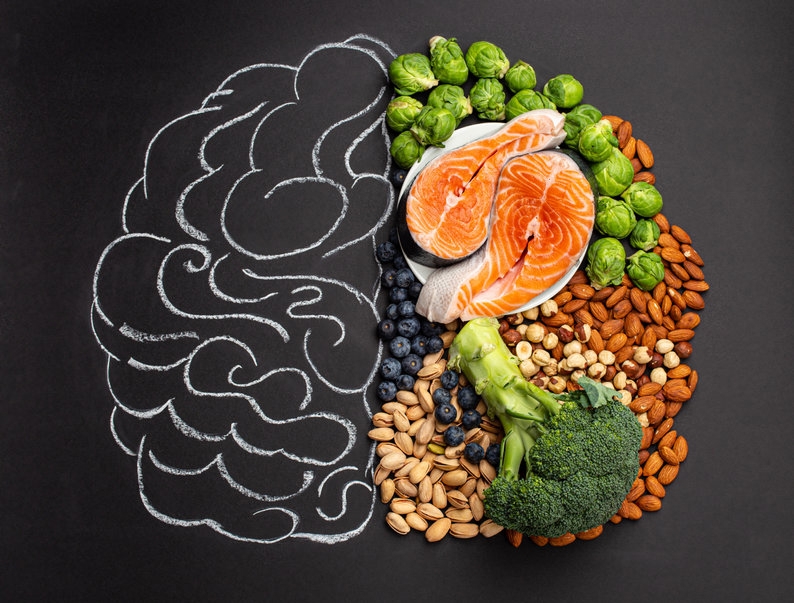Eating For Brain Health
By Julie Rake, MSPAS-PAC
There are numerous articles and books that recommend specific diets and nutrients for individuals who have a brain injury. Although each person has unique needs and requirements when it comes to overall his or her wellbeing, there are some recommendations that are key.
So, why is it that the Mediterranean Diet provides so many promising benefits? The simple answer is fat.
Eating For Brain Health
By Julie Rake, MSPAS-PAC
There are numerous articles and books that recommend specific diets and nutrients for individuals who have a brain injury. Although each person has unique needs and requirements when it comes to overall his or her wellbeing, there are some recommendations that are key.
So, why is it that the Mediterranean Diet provides so many promising benefits? The simple answer is fat.
One such recommendation is the Mediterranean Diet plan, which consists mainly of limiting meat consumption while increasing the intake of wild-caught fatty fish. The diet also supports eating abundant fruits, vegetables, nuts, seeds, legumes, and spices, as well as using olive oil as the main cooking oil. Furthermore, the Mediterranean Diet has the potential to reduce inflammation and support the regeneration and recovery of the brain.
So, why is it that the Mediterranean Diet provides so many promising benefits? The simple answer is fat. Our brain is composed of 60% fat. One fat in particular, DHA, or docosahexaenoic acid, is the single-most important nutrient associated with the health, building, and maintenance of our brains. DHA is incorporated into the cell wall of our neurons. It supports communication between brain cells, and boosts levels of BDNF, a substance that supports and protects existing brain cells and encourages new brain cell growth.
Michael Crawford, PhD, FSB, FRCPATH, pioneered the research in 1972 that resulted in the discovery that the brain requires DHA for its growth, structure, and function. From this foundation, it was recognized that fish high in the omega-3 fat DHA was critical to early man’s brain development, evolutionary advancement, and intellect.
Essentially, the omega-3 fat DHA became known as one of the primary vehicles for human intelligence and evolution.
The human body can make most of the fat it needs, but omega-3 fats are essential, meaning the body cannot make them naturally, so we have to get them from food. Some demonstrable benefits of omega-3 fats include decreased risk of sudden death, lower blood pressure, lower heart rate, better artery health, improved cholesterol numbers, and numerous other positive brain effects.
It is not enough to just eat more omega-3 fats; it is important to understand the dietary problems we are facing. The current American diet is seriously deficient in omega-3 fats and over-burdened with unhealthy, inflammation-causing omega-6 fats. Research indicates that our hunter-gatherer ancestors consumed omega-6 to omega-3 fats in a ratio of roughly 1:1. In the typical American diet today, we see a ratio of 12-25:1, which is shocking! How did we become so lacking in healthy fats? The problem started with the advent of processed foods in the early 1900s, when the American food industry started to become inundated with the bad omega-6 fats. The introduction of processed foods brought salad dressing, mayonnaise, chips, fast food hamburgers, French fries, chicken nuggets, cookies, candy, cakes, pastries, muffins, and much more–all high in omega-6 fats.
American’s diets have also been infused with more omega-6 fats due to the increase in corn and soybeans fed to the animals and fish, which people then cheerfully consume. Most people think the origin of omega-3 fats comes innately from fish, but these good fats actually come from the green ocean plants the fish eat. Omega-3s also exist in green leaves and grass on land. Animals that once grazed on grass are now being fed corn and soymeal at factory farms, and even fish are given this meal in fish farms. Thus, the poultry, beef, and other animals we eat now are transferring these unhealthy omega-6 fats to us.
These changes in the American diet have caused our omega-3 fat consumption to diminish and our omega-6 fats to soar. Omega-6 fats promote blood clotting, inflammation, tumor growth, and weight gain, while omega-3 fats protect against all of these effects. Furthermore, omega-6 fats compete with healthy omega-3 fats for a seat on our cell membrane.
It is now accepted that the increasing rates of neuro-degenerative diseases, like Alzheimer’s and other dementias, mood disorders, and psychiatric illnesses can be linked in a number of ways to the quickly changing diet of the western world. Equipped with this information, how can a person return to a more ancestral diet? Here are some recommendations:
- Try the Mediterranean diet
- Cut out all processed foods that have been packaged and canned at a factory
- Stop eating fast food
- Purchase meat and dairy products that come from pastured rather than factory-farmed animals. Choose wild-caught fish rather than farmed fish
- Try to cut out all sources of sugar except fruit and small indulgences of pure maple syrup or honey. Enjoy dark chocolate that contains 70% or more cacao in small quantities
- Indulge abundantly in spices and eat mindfully
What can I eat to increase my intake of omega-3 fats?
- Cold water, high-fat fish like salmon, sardines, anchovies, trout, herring, mackerel, and anchovies
- Flaxseed oil, flaxseed meal, hempseeds, pumpkin seeds, sesame seeds, chia seeds, brazil nuts, and walnuts
- Avocados and dark, leafy green vegetables like kale, spinach, purslane, mustard greens, collards, watercress, and Brussels sprouts
Nutritional Tips for Survivors of Head Injuries
“Feed Your Body, Feed Your Brain: Nutritional Tips to Speed Recovery.” By Mary Ann Keatley, PhD, CCC and Laura L. Whittemore, Brain Injury Hope Foundation.
- Eat small meals every three to four hours
- Have small baggies of healthy snacks available during the day for an energy boost, filled with items such as nuts, trail mix, apples, cheese, hard-boiled eggs, and energy bars
- Balance small meals with a combination of protein, healthy fats/oils, and carbohydrates
—Proteins include fish, nuts, seeds, legumes, and eggs
—Healthy fats and oils can be found in avocados, seeds, and nuts
—Carbohydrates are found in vegetables, fresh fruits, and whole grains. Avoid eating carbohydrates by themselves if there are concerns about blood sugar
—Many individuals report that sugar and chocolate increase headaches, so eat sweets sparingly
- Practice moderate eating. Do not overeat, as this can cause feelings of sleepiness
- Eat by the clock. If brain/body signals are not working well, set an alarm on a watch or mobile phone for reminders that it’s time to eat. Since weight gain is common following brain injury, sticking to a healthy diet is important
- Try to eat around the same time every day. The body does best on a routine schedule
REFERENCE: Stetka, Bret. “By Land or by Sea: How did Early Humans Access Key Brain-Building Nutrients?” Scientific American, 1 Mar. 2016

Julie is the Immediate Past President of the Brain Injury Alliance of Arizona Board of Directors, Owner of Arizona Integrative Medicine & Spa
ABOUT BRAIN INJURY ALLIANCE OF ARIZONA
The Brain Injury Alliance of Arizona (BIAAZ) is the only statewide nonprofit organization dedicated to improving the lives of adults and children with all types of brain injuries through prevention, advocacy, awareness and education. BIAAZ also houses the Arizona Brain Health Resource Center, a collection of educational information and neuro-specific resources for brain injury survivors, caregivers, family members and professionals.
What began in 1983 as a grassroots effort has grown into a strong statewide presence, providing valuable life-long resources and community support for individuals with all types of brain trauma at no charge.
The Brain Injury Alliance of Arizona:
- Works with Congressional Brain Injury Task Force
- Houses Arizona Brain Health Resource Center
- Hosts Statewide Opioid Use Disorder & Cognitive Impairment Workgroup
- Has Statewide Opioid Use Disorder & Cognitive Impairment Response team with peer support, training, and family wraparound services
- Facilitates Brain Health Advisory Council
- Manages statewide Neuro Info-Line: 888-500-9165






